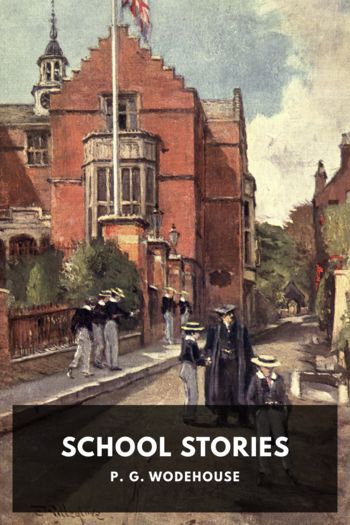School Stories - P. G. Wodehouse (best e book reader TXT) 📗

- Author: P. G. Wodehouse
Book online «School Stories - P. G. Wodehouse (best e book reader TXT) 📗». Author P. G. Wodehouse
Mr. Seymour looked thoughtfully for a moment at the blackboard.
“That was rather a crude effort,” he said pleasantly to Babington, “you lack finesse. Pick it up again, please.”
Babington picked it up without protest. Under the rule of the Rev. Septimus this would have been the signal for the rest of the class to leave their places and assist him, but now they seemed to realize that there was a time for everything, and that this was decidedly no time for indoor games.
“Thank you,” said Mr. Seymour, when the board was in its place again. “What is your name? Eh, what? I didn’t quite hear.”
“Babington, sir.”
“Ah. You had better come in tomorrow at two and work out examples three hundred to three-twenty in Hall and Knight. There is really plenty of room to walk in between that desk and the blackboard. It only wants practice.”
What was left of Babington then went to his seat. He felt that his reputation as an artistic player of the game had received a shattering blow. Then there was the imposition. This in itself would have troubled him little. To be kept in on a half-holiday is annoying, but it is one of those ills which the flesh is heir to, and your true philosopher can always take his gruel like a man.
But it so happened that by the evening post he had received a letter from a cousin of his, who was a student at Guy’s, and from all accounts was building up a great reputation in the medical world. From this letter it appeared that by a complicated process of knowing people who knew other people who had influence with the management, he had contrived to obtain two tickets for a morning performance of the new piece that had just been produced at one of the theatres. And if Mr. J. S. M. Babington wished to avail himself of the opportunity, would he write by return, and be at Charing Cross Underground bookstall at twenty past two.
Now Babington, though he objected strongly to the drama of ancient Greece, was very fond of that of the present day, and he registered a vow that if the matter could possibly be carried through, it should be. His choice was obvious. He could cut his engagement with Mr. Seymour, or he could keep it. The difficulty lay rather in deciding upon one or other of the alternatives. The whole thing turned upon the extent of the penalty in the event of detection.
That was his dilemma. He sought advice.
“I should risk it,” said his bosom friend Peterson.
“I shouldn’t advise you to,” remarked Jenkins.
Jenkins was equally a bosom friend, and in the matter of wisdom in no way inferior to Peterson.
“What would happen, do you think?” asked Babington.
“Sack,” said one authority.
“Jaw, and double impot,” said another.
“The Daily Telegraph,” muttered the tempter in a stage aside, “calls it the best comedy since Sheridan.”
“So it does,” thought Babington. “I’ll risk it.”
“You’ll be a fool if you do,” croaked the gloomy Jenkins. “You’re bound to be caught.” But the Ayes had it. Babington wrote off that night accepting the invitation.
It was with feelings of distinct relief that he heard Mr. Seymour express to another master his intention of catching the twelve-fifteen train up to town. It meant that he would not be on the scene to see him start on the Hall and Knight. Unless luck were very much against him, Babington might reasonably hope that he would accept the imposition without any questions. He had taken the precaution to get the examples finished overnight, with the help of Peterson and Jenkins, aided by a weird being who actually appeared to like algebra, and turned out ten of the twenty problems in an incredibly short time in exchange for a couple of works of fiction (down) and a tea (at a date). He himself meant to catch the one-thirty, which would bring him to town in good time. Peterson had promised to answer his name at roll-call, a delicate operation, in which long practice had made him, like many others





Comments (0)